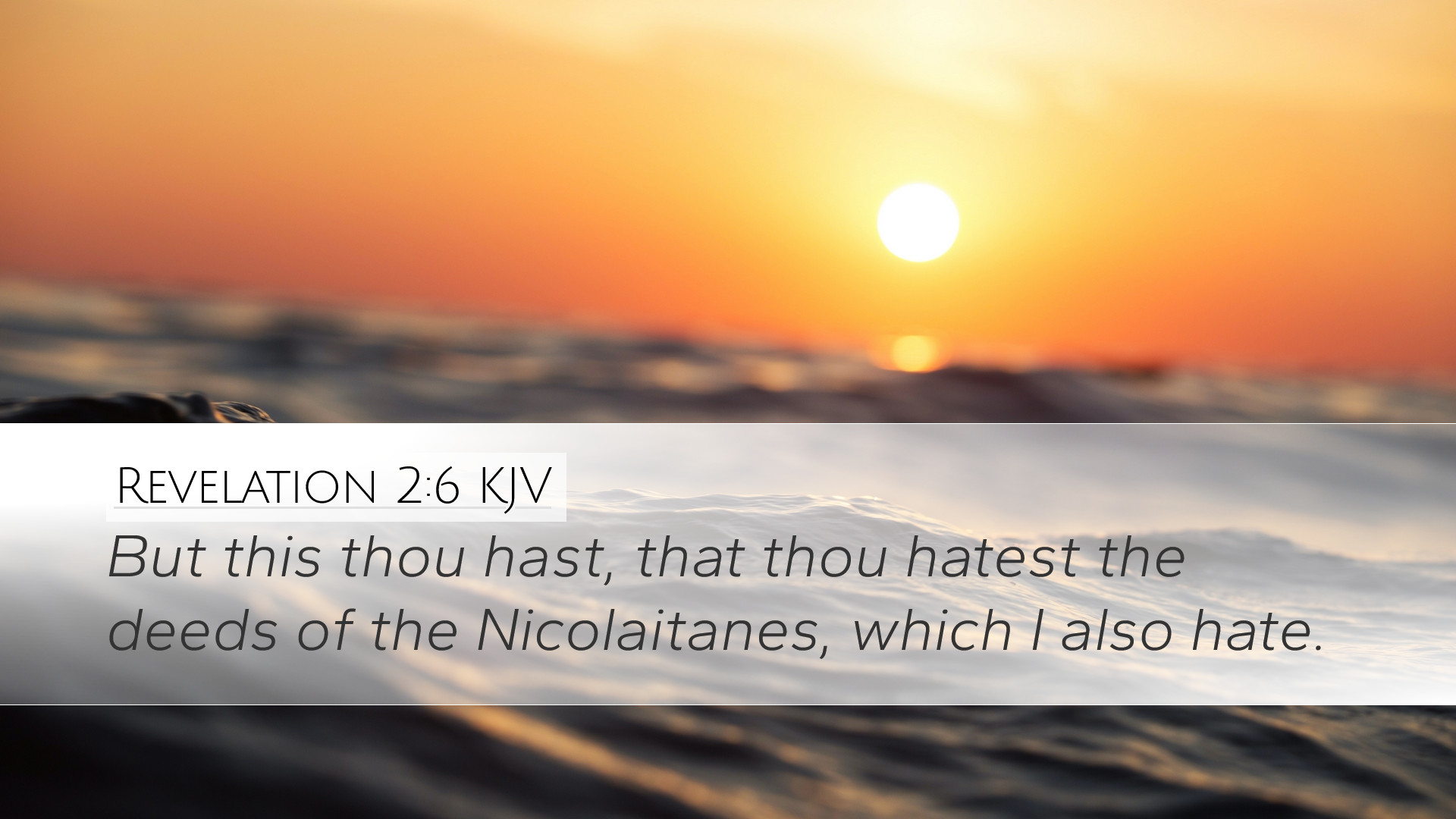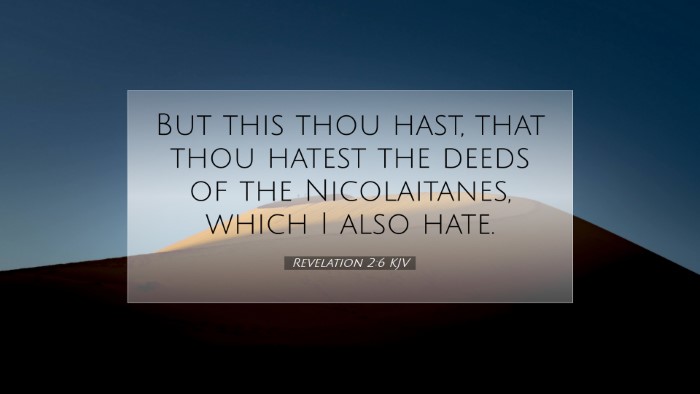Commentary on Revelation 2:6
Scripture Reference: Revelation 2:6 - "But this you have, that you hate the deeds of the Nicolaitans, which I also hate."
Introduction
This verse is part of Christ's message to the church in Ephesus, expressing both commendation and admonition. It indicates a clear stance against the Nicolaitans, a group whose deeds were deemed ungodly. A comprehensive exploration of this text, alongside historical and theological insights, can provide profound understanding for pastors, theologians, and students of Scripture.
Contextual Analysis
The book of Revelation is a prophetic text attributed to John, focusing on the churches and their condition during the late first century. Ephesus was a significant city and the first church addressed in the letters to the seven churches. The Nicolaitans, mentioned here, were a sect promoting practices contrary to the teachings of Christ, compelling the church to uphold moral integrity.
Historical Background
Matthew Henry notes that the Nicolaitans are often associated with a form of antinomianism, advocating for immoral behavior under the guise of Christian freedom. This heretical group is thought to be related to Nicolas, one of the original seven deacons, although this connection remains debated.
Key Themes and Analysis
1. The Importance of Hate in Spiritual Discernment
Henry emphasizes that Christ praises the Ephesians for their aversion to the deeds of the Nicolaitans, indicating that there are indeed things, even within the church, that warrant such strong opposition. The concept of hating evil is not contrary to Christian love; rather, it is an essential aspect of spiritual discernment and protection of the church.
2. The Nature of Nicolaitan Practices
Albert Barnes elaborates on the probable beliefs and practices of the Nicolaitans, suggesting they represented a faction that compromised with pagan culture, leading to moral laxity among believers. Their actions contrasted starkly with the church's call to holiness. This duality highlights the dangers of syncretism in the faith.
3. Christ's Indignation Against Sin
Adam Clarke reflects on the phrase "which I also hate," interpreting it as an emphatic declaration of Christ's stance against sin. The inclusion of such strong language demonstrates the seriousness of the issue. It serves as a warning to the church about the consequences of complacency in the face of doctrinal corruption.
Theological Implications
This verse engages deeply with themes of holiness, righteousness, and moral purity within the church. The identification of certain actions as hateful to God prompts a serious exploration of contemporary church practices.
1. A Call to Holiness
As pastors and theologians reflect on this verse, there lies a call to uphold the values of holiness, emphasizing that love for God encompasses a rejection of sin. It stresses the necessity for the church to engage in self-examination against prevailing cultural influences that may dilute their witness.
2. The Nature of True Love
Understanding hate in this context reveals that genuine love must sometimes manifest itself in opposition to evil. Clarke explains that true affection for God demands a fierce repudiation of anything that attempts to undermine His holiness, thereby shaping the believers' approach to morality.
Applications for Today
The admonition in Revelation 2:6 has practical applications that resonate with the modern church. The challenge remains to discern between cultural relevance and spiritual compromise.
1. Upholding Doctrinal Integrity
Church leaders are tasked with the responsibility of maintaining doctrinal purity, akin to the church in Ephesus. This entails diligent teaching, guarding against false teachings, and modeling a lifestyle reflective of biblical standards.
2. Addressing Moral Compromise
Christians today must not shy away from addressing issues within the church that parallel the deeds of the Nicolaitans. There is a need for boldness in confronting moral ambiguities, ensuring that the love for God translates into a life lived in accordance with His will.
Conclusion
Revelation 2:6 serves as a poignant reminder of the delicate balance between love and hate within the spiritual journey of the church. It challenges believers to engage in a reassessment of their attitudes towards sin while affirming that hatred of evil is a protective measure for faithfulness to God. The insights drawn from historical commentaries aid in understanding the weight of this Scripture as both a warning and an encouragement to uphold righteousness in a world rife with compromise.


